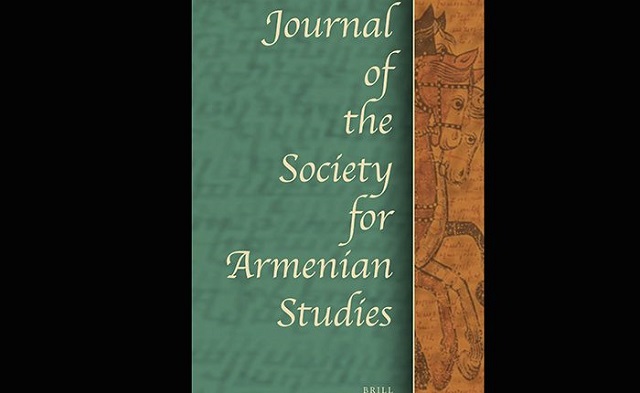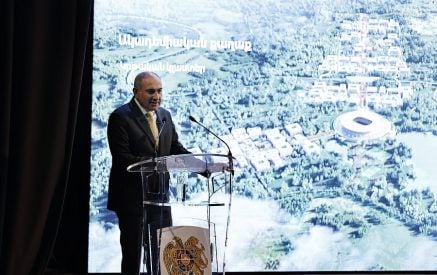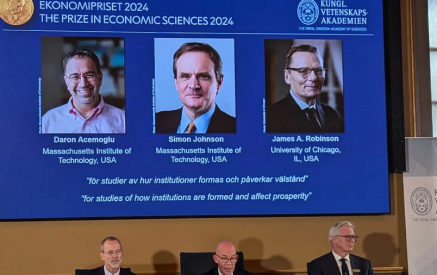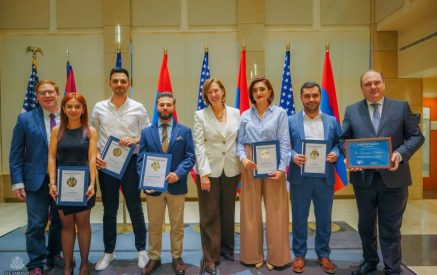The articles in this issue address topics in Armenian religious practice, philology, the Armenian Genocide, contemporary literature, and the transmission of traumatic memory.
The volume begins with a study by Anna Ohanjanyan of Čʻēlēpi Kʻēōmiwrčean’s Polemical Writing against Sukʻias Prusacʻi. This article examines the reshaping of the orthodoxy of the Armenian Apostolic Church along the lines of European confession-building and Ottoman sunnitization, in the face of Tridentine Catholicism. Ohanjanyan contextualizes these polemic writings and the ways of detecting “bad innovations” versus those enforcing “pure faith” in the doctrine and practice of Armenian communities in the Ottoman realms in the late seventeenth century.
Ohanjanyan’s article is followed by Jesse S. Arlen’s micro-historical study of an episode in Joseph Emin’s Life and Adventures, where Emin encounters Armenian villagers in the town of Jinis. Arlen reads this episode within the greater context of eighteenth century “port Armenians” and Armenian merchant culture in the early modern world, while also reflecting on the growing divergences between viewpoints of developments in this period, and that of rural dwellers like the local villagers and priests of Jinis.
Read also
Maria Armoudian and Vukan Jokic provide an in-depth study of the portrayals of Armenia and Armenians in the New Zealand media from 1842 up to the beginning of the 1915 Armenian Genocide. Their sample includes over 35,000 archived national and local newspaper articles, as well as other types of news reports in the period. In addition to categorizing the various representations of Armenians in these papers—including a special discussion of women, the article further serves as a reminder of the Armenian community of New Zealand, which is not often considered in historical studies of Armenians, especially during this period.
The final full-length article in this volume is the work by Maral Aktokmakyan devoted to Madt‘ēos Mamurian’s English Letters or the Destiny of an Armenian. Aktomakyan argues for the role of the strange, stranger, and uncanny in Mamurian’s text, and its engagement with modernity as a framework which hopes to reawaken the Armenian nation and its political voice in a late nineteenth century Ottoman Empire.
The table of contents for JSAS 27 (1) can be accessed here.
In addition to these articles, Volume 27, Issue 1 also contains the following book reviews: Gohar Grigoryan Savary’s review of Heghnar Watenpaugh’s The Missing Pages: The Modern Life of a Medieval Manuscript, from Genocide to Justus; Michael Pifer’s review of Christina Maranci’s The Art of Armenia: An Introduction; Alison M. Vacca’s review of the edited volume by Houri Berberian and Touraj Daryaee entitled, Reflections of Armenian Identity in History and Historiography; Alyssa Mathias’s review of Sylvia A. Alajaji’s Music and the Armenian Diaspora: Searching for Home in Exile; and Zaruhi Hakobyan’s review of Yana Tchekhanovets’s The Caucasian Archaeology of the Holy Land: Armenian, Georgian and Albanian Communities.
The JSAS continues to strive to make the journal more visible in the national and international academic arena. The JSAS is also very excited about this new partnership with Brill. As the Society for Armenian Studies President, Bedross Der Matossian (University of Nebraska-Lincoln) commented in his message: “We look forward to a fruitful collaboration with Brill with the aim of transforming the Journal into a global hub of disseminating knowledge about Armenian Studies… JSAS will open new horizons for developing as a cross-cultural and interdisciplinary field…I have no doubt that JSAS will soon become a prestigious journal attracting scholars from all around the globe.” The JSAS also thanks its former Editor-in-Chief Sergio La Porta for his decade of dedicated service.
Tamar M. Boyadjian, Michigan State University, continues as the Editor. The Book Review Editor for this volume was Michael Pifer, University of Michigan, Ann Arbor. The journal now has moved from having only a book review section to a now including a section entitled “Reviews and Reconsiderations” with the editorial team of Rachel Goshgarian, Lafayette College; Nora Lessersohn, University College London, and Erin Piñon, Princeton University. The Advisory Board consists of: Bedross Der Matossian, University of Nebraska, Lincoln; Barlow Der Mugrdechian, California State University, Fresno; Sharon Kinoshita, University of California, Santa Cruz; Alison Vacca, The University of Tennessee, Knoxville; Jyotsna Singh, Michigan State University; and Rachel Goshgarian, Lafayette College. The Editorial Board consists of: Sebouh Aslanian, University of California, Los Angeles; Stephan Astourian, University of California, Berkeley; Marie-Aude Baronian, University of Amsterdam; Houri Berberian, University of California, Irvine; Talar Chahinian, University of California, Irvine; Myrna Douzjian, University of California, Berkeley; Shushan Karapetian, University of Southern California; David Kazanjian, University of Pennsylvania; Lilit Keshishyan, University of Southern California; Tsolin Nalbantian, University of Leiden; Christina Maranci, Tufts University; Hratch Tchilingirian, University of Oxford; and Heghnar Watenpaugh, University of California, Davis.
The Journal of the Society for Armenian Studies is a peer-reviewed journal and is published bi-annually by Brill. The Journal can be accessed here:
SAS members can contact the SAS Secretariat, Barlow Der Mugrdechian at 559-278-2669 or by email at [email protected], for either a print copy or online access to the volume. Copies of the latest volume, and back issues, are also available by contacting the SAS Secretariat, or can be ordered online at societyforarmenianstudies.com.




























































